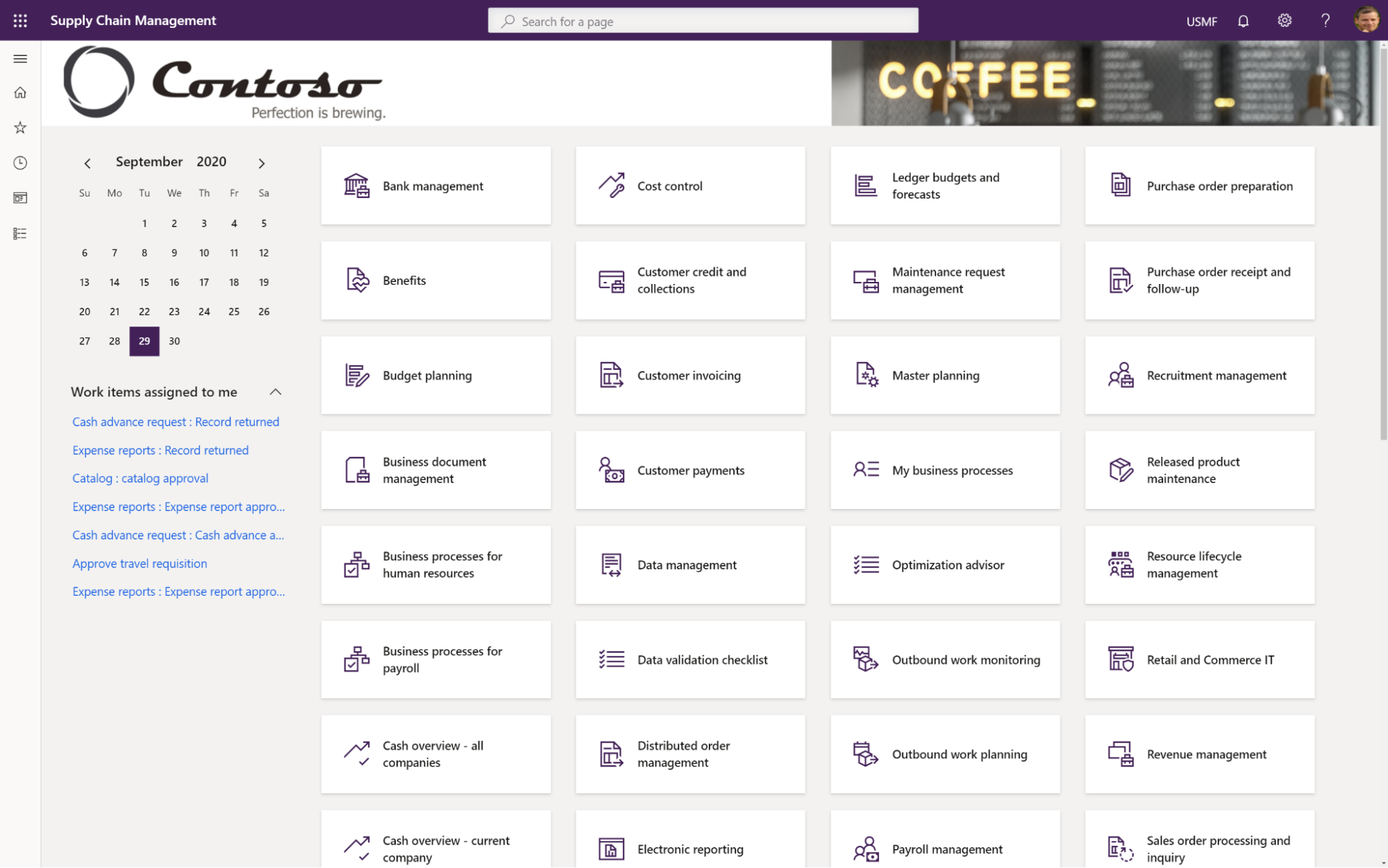Dynamics 365 Finance
As a powerful enterprise resource planning solution, Dynamics 365 Finance helps companies refine their financial management. It focuses on business process automation, and allows for optimizing and reducing costs. With the Finance and Operations module, enterprises can streamline financial processes such as budget planning, cost analysis and control, cash overview, cost accounting ledger administration, fixed asset and human capital management, ledger budget and forecasting, and more (see Figure 4). According to the 2022 Forrester report, firms can increase their ROI up to 122% with Dynamics 365 Finance over three years.
The solution offers financial visibility and reporting capabilities so that users can analyze financial data, track key performance indicators, and generate reports to support their decision-making. Thanks to a broad range of advanced and predictive capabilities, companies can discover cost-saving opportunities and optimize resource allocation. Figure 4. Dynamics 365 Finance
Figure 4. Dynamics 365 Finance
This business module is tailored for: large enterprises and medium-sized companies operating in finance, healthcare, manufacturing, retail, automotive, etc.

Dynamics 365 Human Resources
The digital employee experience is essential for companies seeking to create a thriving work environment. Dynamics 365 Human Resources lends itself to the challenge, providing several vital functions in employee management. With this application within the Dynamics 365 family, you can craft a universal source of knowledge across your organization. In this way, the employees can easily find accurate information about benefits, perks, leave and absence policies, certifications, or compliance programs all in one place (see Figure 5). The tool also empowers businesses to seek and find employee feedback on their working experiences and adjust HR practices accordingly. Figure 5. Dynamics 365 Human Resources
Figure 5. Dynamics 365 Human Resources
This business module is tailored for: large enterprises and medium-sized companies.

Dynamics 365 Marketing
Dynamics 365 Marketing is a prebuilt application designed to drive greater customer engagement and provide insights into hidden data patterns. Acting as a gateway to personalized and targeted marketing campaigns, it empowers businesses to target the right audiences and amplify customer journeys. Leveraging omnichannel content engagement, specialists can critically analyze and evaluate the impact of their marketing performance.
Here is an example of how to organize email content across various brands and locations (see Figure 6). A user-friendly interface and convenient design tools allow for keeping email content consistent and recognizable all over major communications channels: Figure 6. Dynamics 365 Marketing
Figure 6. Dynamics 365 Marketing
This business module is tailored for: large enterprises and medium-sized companies.

Dynamics 365 Sales
Dynamics 365 Sales aims to uncover the potential for attracting new clients and building a cohesive sales process. With this application, sellers can access detailed customer profiles that include contact information, preferences, past interactions, and purchase history. Furthermore, the application’s built-in intelligence and predictive analytics provide valuable insights into buyer behavior and enable experts to anticipate ever-evolving needs while pinpointing cross-selling or upselling opportunities based on sales data (see Figure 7). According to a Forrester report, the Dynamics 365 sales module empowered companies to level up their ROI by 215%, with seven months required to trigger the payback period. Figure 7. Dynamics 365 Sales
Figure 7. Dynamics 365 Sales
This business module is tailored for: large enterprises and medium-sized companies.

Dynamics 365 Project Operations
Simplified project management practices are up for grabs with Dynamics 365 Project Operations. This instrument serves as a platform for unified project delivery and offers specialists a comprehensive set of capacities. For example, a business can leverage the Project Operations’ potential to track and estimate progress, foresee trends and tendencies, improve resource allocation, get valuable information on tracking and expense management, etc. Access to this centralized hub makes it easy to organize project management teams, and deliver projects on time and within budget (see Figure 8). Figure 8. Dynamics 365 Project Operations
Figure 8. Dynamics 365 Project Operations
This business module is tailored for: large enterprises and medium-sized companies.

Dynamics 365 Intelligent Order Management
Managing an entire order lifecycle with the Dynamics 365 Intelligent Order Management application is made effortless and efficient. This powerful tool seamlessly handles order processing, fulfillment, and tracking from end to end. Hence, companies can automate processes (e.g., order capture), safeguard accurate inventory management, and amplify order routing and fulfillment across various channels. The application can be integrated with multiple systems and platforms, allowing real-time visibility into order statuses, inventory levels, and shipment tracking. It also enables businesses to proactively manage order-related issues and propel customer satisfaction. Below is an interface of Intelligent Order Management that showcases critical components and features, including a constraints menu (see Figure 9): Figure 9. Dynamics 365 Intelligent Order Management
Figure 9. Dynamics 365 Intelligent Order Management
This business module is tailored for: large enterprises and medium-sized companies operating in e-commerce, retail, manufacturing, distribution, and logistics, among others.

Dynamics 365 Supply Chain Management
Building a resilient supply chain is a paramount factor in securing strategic advantages for a company. Dynamics 365 Supply Chain Management offers comprehensive support in this endeavor. From procurement and inventory management to production planning and logistics, this solution provides the tools and insights necessary to reduce operational costs and ensure timely delivery of products or services. Forrester’s study highlights that organizations can increase their developer productivity by up to 50% with the Dynamics 365 Supply Chain Management business module. This is an example of the solution’s interface, which reflects a wide variety of opportunities companies can tap into, be it bank management and cost control or outbound work planning and electronic reporting (see Figure 10): Figure 10. Dynamics 365 Supply Chain Management
Figure 10. Dynamics 365 Supply Chain Management
This business module is tailored for: SMEs and large-scale organizations.

Dynamics 365 Customer Service
With the Dynamics 365 Customer Service module, providing outstanding service across different channels becomes effortless. This application empowers organizations to streamline case management, deploy intelligent routing, and transfuse self-serve with automation, all while delivering personalized service. Here, they can access customer, channel, and conversational analytics. Below is an example of how to deploy Customer Service to discover valuable information about the company’s KPIs, Customer Satisfaction Score (CSAT), and other metrics on customer service interactions (see Figure 11): Figure 11. Dynamics 365 Customer Service
Figure 11. Dynamics 365 Customer Service
This business module is tailored for: SMEs and large-scale organizations.

Dynamics 365 Customer Insights
Dynamics 365 Customer Insights aims to consolidate customer data from various sources into a single unified view (see Figure 12). It demonstrates various data points, including purchase history, interactions, preferences, and demographics. One of the key strengths of Dynamics 365 Customer Insights lies in its seamless integration with other applications such as Marketo, Google Ads, or ServiceNow. Acquiring a bird’s eye view can deliver exceptional service experiences and optimize service operations. Figure 12. Dynamics 365 Customer Insights
Figure 12. Dynamics 365 Customer Insights
This business module is tailored for: SMEs and large-scale organizations.

Dynamics 365 Customer Voice
This Microsoft Dynamics solution brings to the forefront customers’ feedback. It helps companies design and distribute surveys in order to collect information at various touchpoints in the customer’s journey (see Figure 13). This application uncovers everything that you could previously pass over – customer sentiment, intricate trends, and unobvious metrics. With Dynamics 365 Customer Voice, the enterprise can capture both quantitative and qualitative feedback, and learn new information from detailed reports and dashboards. As a result, they can act upon customer feedback effectively and build stronger business relationships. Figure 13. Dynamics 365 Customer Voice
Figure 13. Dynamics 365 Customer Voice
This business module is tailored for: SMEs and large-scale organizations.

Dynamics 365 Fraud Protection
Protecting a business against cyber threats is a powerful way to support its reputation and cultivate brand loyalty. Dynamics 365 Fraud Protection embodies a business module that boosts risk mitigation associated with online transactions. Being transfused with the power of AI, this tool can detect and prevent fraudulent activities and fraud patterns, which cultivates a secure and reliable environment for business operations. It revolves around purchase protection, account protection, and loss prevention. Here, you can also access intuitive reporting tools to drive data-based decision-making (see Figure 14): Figure 14. Dynamics 365 Fraud Protection
Figure 14. Dynamics 365 Fraud Protection
This business module is tailored for: SMEs and large-scale brick-and-mortar organizations operating in e-commerce.

Dynamics 365 Guides
Reducing human error and improving knowledge-sharing across the organization are essential and challenging tasks. Dynamics 365 Guides is designed to help companies cope with these tasks. This application provides a platform for creating and sharing interactive step-by-step guides and instructions via 3D-guided experiences (see Figure 15). To deliver enriched and profound training, organizations can integrate this tool with HoloLens, a mixed-reality headset, and Microsoft Teams. Figure 15. Dynamics 365 Guides
Figure 15. Dynamics 365 Guides
This business module is tailored for: SMEs and large-scale organizations.

Dynamics 365 Remote Assist
Dynamics 365 Remote Assist is designed to revamp and optimize the company’s service management and delivery. This tool is closely intertwined with other business solutions within the Dynamics 365 family, especially Dynamics 365 Field Service, Dynamics 365 Supply Chain Management, Microsoft Power Platform, and Power Virtual Agents. Remote Assist equips businesses with a platform where remote experts and technicians can communicate in real-time (see Figure 16). Using data across multiple applications from the aforementioned suite, organizations can readily access critical information while providing 24/7 support. Forrester discovered that a payback period for Dynamics 365 Remote Assist typically comprises 12 months. Figure 16. Dynamics 365 Remote Assist
Figure 16. Dynamics 365 Remote Assist
This business module is tailored for: SMEs and large-scale organizations.

Limitations
Despite their numerous strengths, the Dynamics 365 business modules have certain limitations. Their implementation can heavily rely upon additional investments in external support and training due to a steep learning curve (72% of companies claim that inadequate sponsorship is one of the top barriers for enterprise resource planning software, according to a Deloitte report). To handle occasional system downtime or technical issues, companies typically rely on technical support from Microsoft or their managed service providers. In addition, although the Dynamics 365 modules have a wide range of functionalities, some businesses may find certain niche specifications or specialized industry needs inadequately addressed. In this scenario, customization options can help lend a helping hand, but they may require extra development efforts and ongoing maintenance. Furthermore, scalability challenges may arise for organizations experiencing rapid growth or significant increases in data volume.
To tackle these challenges, companies can opt for several options. Firstly, there is an opportunity to invest in comprehensive training programs and to partner with experienced consultants who will alleviate the learning curve and ensure a smoother implementation process. Secondly, maintaining a strong relationship with technical support providers and having contingency plans in place for system downtime can help minimize disruptions to business operations. Regarding the niche specifications, businesses may need to explore custom development or seek third-party business solutions to meet their specific needs. Regular evaluation of scalability requirements and proactive monitoring of system performance can fix potential scalability challenges as the business grows.
Final thoughts
At its core, Microsoft Dynamics 365 represents a versatile platform that empowers companies to automate repetitive tasks and drive sustainable growth across different departments. Whether you strive to improve sales performance, drive marketing ROI, or improve customer relationship management, Dynamics 365 offers various business modules to cope with the task. Leverage the power of automation, data analytics, and integration capabilities with Microsoft to hone your competitive advantage in a dynamic business landscape; contact us to learn more.


 Figure 1.
Figure 1. 
 Figure 2.
Figure 2. 
 Figure 3.
Figure 3. 
 Figure 4.
Figure 4. 
 Figure 5.
Figure 5. 
 Figure 6.
Figure 6. 
 Figure 7.
Figure 7. 
 Figure 8. Dynamics 365
Figure 8. Dynamics 365 
 Figure 9. Dynamics 365
Figure 9. Dynamics 365 
 Figure 10. Dynamics 365
Figure 10. Dynamics 365 
 Figure 11.
Figure 11. 
 Figure 12.
Figure 12. 
 Figure 13.
Figure 13. 
 Figure 14.
Figure 14. 
 Figure 15.
Figure 15. 
 Figure 16.
Figure 16. 







